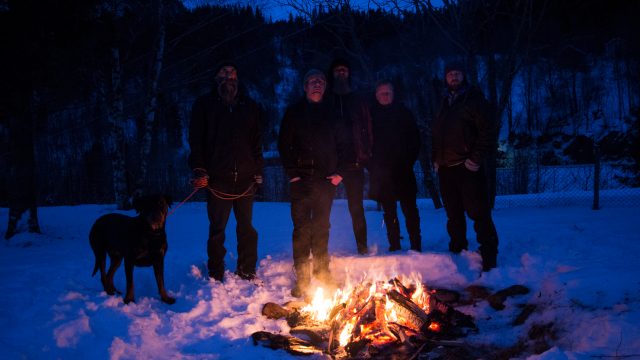
Norwegian band Manes recently released “Slow Motion Death Sequence”, their fifth album. This is a band which has experienced various transformations and name changes since 1991, but whose music has always been unusual and on the edge. To find out what makes the band tick, Andrew Doherty interviewed Tor-Helge Skei (THS), founder member and the band’s guitarist, keyboardist and programmer, and bass player Torstein Parelius (TP).
Ave Noctum: Hi there! I appreciate the fact that you are giving the time for this interview. I really enjoyed your latest album “Slow Motion Death Sequence”. I’ll come on to that in a minute but taking everything that I’ve heard from Manes, it all sounds musically like an open house for ideas. Is that how you see it?
THS: yes, that’s a good way to describe it.
TP: All ideas are at least listened to, tried and tested, and – if there is an initial spark of something there – we use our full arsenal of tools to work on them until they are fleshed out full songs.
AN: Going back to the “How the World came to an End” and “Be All and End All” albums in particular, I experienced a delightful confusion of styles and sounds where I find recognisable song structures but it’s all immersed in a weird and hazy outer world. Is it fair to say that your world is a mentally disturbed place, which does not smell of fresh daisies?
THS: again, yes 🙂
AN: The trip hop, distant echoes, melancholic jazz and dark electro elements tell me not only that you like experimenting with different sound structures, but you like to instil darkness and nightmares. Mixing all these elements sounds like fun. Or is it a painful process?
THS: While we’re working on the music, it’s very impulsive and not very organized or planned… the final mixing is usually done by ‘external’ people, and several of them have mentioned that it’s pretty hard to mix everything.
TP: It can be smooth sailing from idea to finished song some times, but mostly it’s not. Arranging and mixing can be messy and a lot of work, and a lot of darlings are killed off left, right and centre, but we know where we wanna go with it usually. Not necessarily so how to get there. If you’re referring more to the different instrumentation and the mix of styles, analogue and digital etc, that’s not so hard. That flows naturally as we work on things. We don’t force things in, but try to work together to elevate the essence of each song, to use fancy words.
AN: What’s the starting point for a Manes song, and how do you decide that the process is at an end and it’s ready to go?
THS: it can be everything and nothing… we don’t sit down and say “now we’re gonna start a new song”, or anything like that… we make music all the time, small bits and pieces and patterns and tests… not always specifically made for Manes. After a while, we have a huge pile of ‘starting points, ‘sketches’, whatever… and we sift through these, collect what inspires us, and what we think can turn into a great song for Manes.
TP: Yes. Sometimes we think we need to remove a lot of stuff to get where we want with each song too. For “Slow Motion Death Sequence” we were trying a lot of stuff with each song, taking them in different directions, so we actually ended up removing a lot of vocal tracks at the end. Not just more of what you hear on the album, but different “versions”, so to speak. It could have been very different.
AN: The trip hop intrigues me. Personally I’d associate it with urban decay and deserted rain-sodden streets. I don’t know your city in Norway but the trip hop in your music seems more to reflect a state of mind. Is that right?
THS: yes
TP: Not a geographical place like you refer to with urban decay etc, but I understand what you mean. We don’t live in Detroit or Johannesburg or wherever. But as a state of mind, totally so. I haven’t really been following trip hop as a genre lately, but my reference to that is this whole Bristol scene with Tricky, Massive Attack, Portishead etc. that released a handful of good to great albums back in the nineties … but I haven’t been paying attention. The funny thing is, when people try to describe our music it becomes so concrete. We haven’t really tried to combine something with something else. It’s basically just a set of skills, tools, preferences, influences and so on. You know; not metal fused with jazz fused with prog etc. That would be just silly.

AN: Coming on to your latest album “Slow Motion Death Sequence”, while many of the elements I’ve talked about are there, it seems less experimental and quirky to me than previous works. Is that how you see it?
THS: in a way, yes… this time, there were a little bit more of a “band” feeling while tweaking the final versions, so I guess everybody’s ideas crept in, and the sum of it all became a bit more homogenous in a way?
TP: We didn’t go in to the process of making “Slow Motion Death Sequence” with that as an intent, but it might have turned out that way. However, I’m quite happy that people don’t just find it experimental or weird or whatever, but manage to see (or hear) beyond that. So, that’s nice.
AN: I read a commentary by someone who saw the new album thematically. I haven’t yet got that myself. For me there is always something very visual about the different images out of your music, and the “slow motion” world fall into that. What’s the significance of the album title?
THS: it hopefully gives people some “food for thought”… it can be interpreted in a lot of ways, on a personal level, as a commentary on the way society, economics, the entire world, is going….
TP: It had a thematic approach in some ways, as we set out to go darker in many ways. The title has several layers to it, as I see it, and can also definitely be seen as a pointer throughout the album itself, but also more so to individual songs than others.
AN: The opening track “Endetidstegn” is personal, haunting and ethereal, and lays out your musical styles on the table to capture our attention. Were you seeking to devastate your listeners from the beginning?
THS: We didn’t seek out to do anything, really… or, well, we (always) want people to put something of themselves into the music and ‘lyrics’… that’s why we’re so vague about it all, why we don’t want to explain everything… that would take away some of the mystique, and also, it wouldn’t allow people to interpret things in their own ways.
TP: We try to repeat that interpretation is more important than explanation as often as we can, as a way of bait listeners into more immersion, in a way. For me, at least, it adds to the “experience” if both my emotions and my brain are stimulated. As for “Endetidstegn”, we felt it was a good opener in many ways. I still feel that way.
AN: The song, with the most immediate impact on me was “Last Resort”. After I first heard it, I played it three or four times back to back before listening to anything else. The development is so mature, emotionally draining even. Having composed it, how would you explain its immense power?
THS: I have no idea how it affects ‘external’ people … those kind of things have never been an issue for us, actually… we make music we like, and if other people like it, or attaches to it, it’s great, but not really that important for us…
TP: I feel that “Last Resort” tricks people in a way, as it can come across as sort of “ballad-y” with more traditional instrumentation etc, but I really don’t feel it is. It kinda opens up and drags you down.
AN: Does coming from Norway have an influence on your comparatively unusual outlook on musical creation, do you think? In particular I hear different elements of Manes in the music of Green Carnation, Audrey Horne and Atrox amongst others.
THS: Unconsciously, it probably does … climate, economics, society, etc do affect you as a person, your thought patterns etc, and naturally, it creeps into the music we make, and how we think about it … what is important and what is nonsense etc.. but we don’t focus much on it.
TP: In a way, certainly, but I wouldn’t say we influence each other in any particular way nor bring a big chunk of Norway into the music.

AN: Looking outside of Norway, I identified fleeting elements of Pink Floyd and Bowie in your output. What or who are the primary influences on your music?
THS: I don’t think we are very influenced by other music or bands … at least not consciously… but both Pink Floyd and Bowie are both quite interesting artists, though. We all listen to different music, and Manes becomes a mixture of all our influences and ideas.
AN: Your long discography tells me that you don’t like to stand still. You’ve undertaken different projects under different names, stopped as Manes, started again, and well, here we are. What next?
TP: All of us have quite a high level of creative output, and it’s channelled into different bands and projects constantly. Mostly, this is defined by who we make stuff together with, but also sometimes by how we regard the music, like “this feels like a Manes idea” or whatever. It’s not very complicated or confusing for us, but it might look like a mess for you and everyone else. With Manes, we have some new stuff already written, and we’re also working on more, so I do think you’ll hear from us again in the near future. Stay tuned.
AN: And finally, is there anything you’d like to say to readers of Ave Noctum, like if there’s a tour or how to buy the album?
THS: I don’t think you should expect a Manes tour, but the physical album can be purchased here: https://www.debemur-morti.com/en/85-manes-discography, or if you prefer a digital version: https://dmp666.bandcamp.com/album/slow-motion-death-sequence
TP: Yes, we don’t tour. We are planning to do a handful of select gigs some time next year – somewhere – but no dates or anything is set just yet. We’ll see what happens. Check out the video for “Endetidstegn” on Youtube if you get a chance. Cheerio.
AN: Thank you once again! I look forward to being able to continue to enjoying your imaginative work. Best of luck for the future in all your projects!
Interview Andrew Doherty
https://www.facebook.com/manes.no

Leave a Reply